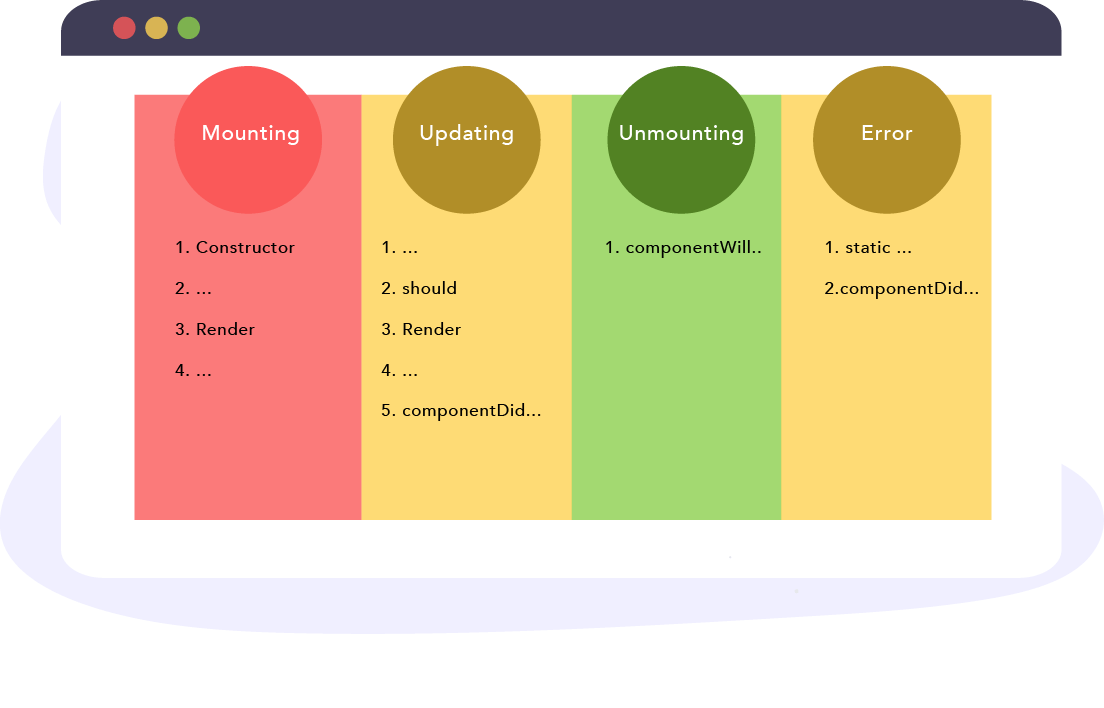- constructor()
- getDerivedStateFromProps()
- render()
- componentDidMount()
class Header extends React.Component {
constructor(props) {
super(props);
this.state = {favoritecolor: "red"};
}
render() {
return (
<h1>My Favorite Color is {this.state.favoritecolor}</h1>
);
}
}
ReactDOM.render(<Header />, document.getElementById('root'));class Header extends React.Component {
constructor(props) {
super(props);
this.state = {favoritecolor: "red"};
}
static getDerivedStateFromProps(props, state) {
return {favoritecolor: props.favcol };
}
render() {
return (
<h1>My Favorite Color is {this.state.favoritecolor}</h1>
);
}
}
class Header extends React.Component {
render() {
return (
<h1>This is the content
of the Header component</h1>
);
}
}class Header extends React.Component {
constructor(props) {
super(props);
this.state = {favoritecolor: "red"};
}
componentDidMount() {
setTimeout(() => {
this.setState({favoritecolor: "yellow"})
}, 1000)
}
render() {
return (
<h1>My Favorite Color is {this.state.favoritecolor}</h1>
);
}
}- getDerivedStateFromProps()
- shouldComponentUpdate()
- render()
- getSnapshotBeforeUpdate()
- componentDidUpdate()
Update Lifecycle
class Header extends React.Component {
constructor(props) {
super(props);
this.state = {favoritecolor: "red"};
}
static getDerivedStateFromProps(props, state) {
return {favoritecolor: props.favcol };
}
changeColor = () => {
this.setState({favoritecolor: "blue"});
}
render() {
return (
<div>
<h1>My Favorite Color is {this.state.favoritecolor}</h1>
<button type="button" onClick={this.changeColor}>Change color</button>
</div>
);
}
}LifeCycle Phase
class Header extends React.Component {
constructor(props) {
super(props);
this.state = {favoritecolor: "red"};
}
shouldComponentUpdate() {
return false;
}
changeColor = () => {
this.setState({favoritecolor: "blue"});
}
render() {
return (
<div>
<h1>My Favorite Color is {this.state.favoritecolor}</h1>
<button type="button" onClick={this.changeColor}>Change color</button>
</div>
);
}
}LifeCycle Phase
class Header extends React.Component {
constructor(props) {
super(props);
this.state = {favoritecolor: "red"};
}
componentDidMount() {
setTimeout(() => {
this.setState({favoritecolor: "yellow"})
}, 1000)
}
getSnapshotBeforeUpdate(prevProps, prevState) {
document.getElementById("div1").innerHTML =
"Before the update, the favorite was " + prevState.favoritecolor;
}
componentDidUpdate() {
document.getElementById("div2").innerHTML =
"The updated favorite is " + this.state.favoritecolor;
}
}Thanks..
LifeCycle Phase

1. constructor()
const MyComponent extends React.Component {
constructor(props) {
super(props)
this.state = {
points: 0
}
this.handlePoints = this.handlePoints.bind(this)
}
}getDerivedStateFromProps()
static getDerivedStateFromProps(props, state) {
return {
points: 200 // update state with this
}
}
static getDerivedStateFromProps(props, state) {
return null
}
The method name getDerivedStateFromProps comprises five different words, “Get Derived State From Props”.
Essentially, this method allows a component to update its internal state in response to a change in props.
class App extends Component {
state = {
points: 10
}
// *******
// NB: Not the recommended way to use this method.
// Just an example. Unconditionally overriding state here is generally considered a bad idea
// ********
static getDerivedStateFromProps(props, state) {
return {
points: 1000
}
}Render
class MyComponent extends React.Component {
render() {
return [
<div key="1">Hello</div>,
<div key="2" >World</div>
];
}
}componentDidMount
// e.g requestAnimationFrame
componentDidMount() {
window.
requestAnimationFrame(this._updateCountdown);
}
// e.g event listeners
componentDidMount() {
el.addEventListener()
}